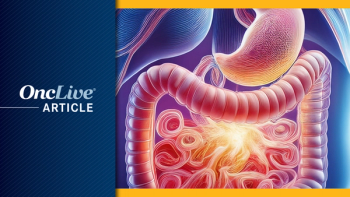
Metastatic Gastric/GEJ Cancer: Multiple Lines of Therapy
Transcript:
David Ilson, MD, PhD: If we look then at the continuum of care throughout many lines of chemotherapy in metastatic gastric cancer, we currently have fairly standard established approaches. For first-line chemotherapy, we need to know HER2 status. For most patients, we would combine a fluorinated pyrimidine with a platinum agent with or without trastuzumab based on the HER2 status. That would be standard first-line chemotherapy. In patients progressing on first-line chemotherapy, standard second-line treatment would be paclitaxel plus ramucirumab. For third-line, we would have to factor in PD-L1 status or MSI [microsatellite instability] status. We could consider third-line irinotecan-based treatment, which would be an option.
If a patient is PD-L1 positive, we have approval of pembrolizumab as a salvage option in chemotherapy-refractory disease. If a patient is MSI-high, there’s even a stronger enthusiasm to use pembrolizumab, given the high response rate and durable responses. In a PD-L1—negative patient, we would have to consider conventional chemotherapy or referral for a clinical trial, given the low degree of efficacy of anti–PD-1 drugs in that population and the fact that we don’t have regulatory approval for those patients.
Minaxi Jhawer, MD: With the advent of personalized medicine, where we’re able to really look at the molecular profiling of the tumor, we get an immense amount of understanding of the biology of the disease and the tumor. It helps us then pave the way of choosing the next lines of therapy that you would use for those patients. The NCCN [National Comprehensive Cancer Network] has very nicely gone over the different regimens to be used. We already know that triplet regimens like DCF [docetaxel/cisplatin/fluorouracil] and ECF [epirubicin/cisplatin/fluorouracil] in the metastatic setting can be far too toxic with minimal improvement in survival and response rate.
If we were to look at some of the doublet regimens, which we’re all very familiar and comfortable treating with, they include FOLFOX [folinic acid/fluorouracil/oxaliplatin], FOLFIRI [folinic acid/fluorouracil/irinotecan], cisplatin/irinotecan, and docetaxel/irinotecan. We are then incorporating some of the targeted drugs like paclitaxel with ramucirumab, which is a VEGF-targeted drug, or using a HER2-targeted drug, trastuzumab, in combination with chemotherapy in the first-line setting, but we are not moving forward in the second and third line because we have limited data for that. And then, as we go through multiple lines of therapies, patients who have been pretreated with chemotherapy and are known to have an MSI-high tumor or PD-L1—overexpressing tumor will then benefit with pembrolizumab or immunotherapy drugs such as that.
David Ilson, MD, PhD: Important in treating a patient with metastatic esophagogastric cancer is treating their symptoms and nutritional-related issues. These are often patients who present with swallowing problems, early satiety, and poor oral intake. Because chemotherapy has responses in about 40% to 50% of patients, these symptoms often become better with initial treatment. Other key issues, aside from nutritional support, would be adequate pain management, psychosocial support, counseling, and even psychiatric support to manage things like depression and family interactions. Nutritional support would potentially be an enteral feeding tube, if it’s absolutely needed. TPN, or total parenteral nutrition, we really frown on because that’s fraught with a lot of complications and is typically not something we would do for most patients. Because chemotherapy has a benefit fairly early on, symptoms often improve.
If patients have obstructing esophageal tumors that can’t be stented, we might sometimes think about an enteral feeding tube. That can be complicated in the management of gastric cancer. If they have ascites and carcinomatosis, they might not benefit from such an approach. But that’s also where the multidisciplinary management comes in, having a good gastroenterologist on board, a pain management team, psychosocial support, and psychiatry if need be.
Minaxi Jhawer, MD: Whenever I see a patient with advanced or metastatic gastric cancer, I always have a very clear discussion about the goals of care. For patients who have unresectable metastatic locally advanced cancers, the goal of care is palliative, which is to improve their symptoms and improve their quality of life by prolonging their survival. Establishing that up front paves the way for a really good relationship through the course of treatment. You’re able to help the patient immensely, and the family, to cope with and achieve what they want to in their limited period of time. We do that with the pain and palliative care team. We team up with the integrative department, which includes getting Reiki and yoga. We’ve extended the yoga, which is complementary yoga for patients, to caregivers because they’re the ones who bring the patients in, take care of the patients, and change their whole lifestyle so that they then continue to help their family member who’s sick get through the treatments.
Transcript Edited for Clarity



































